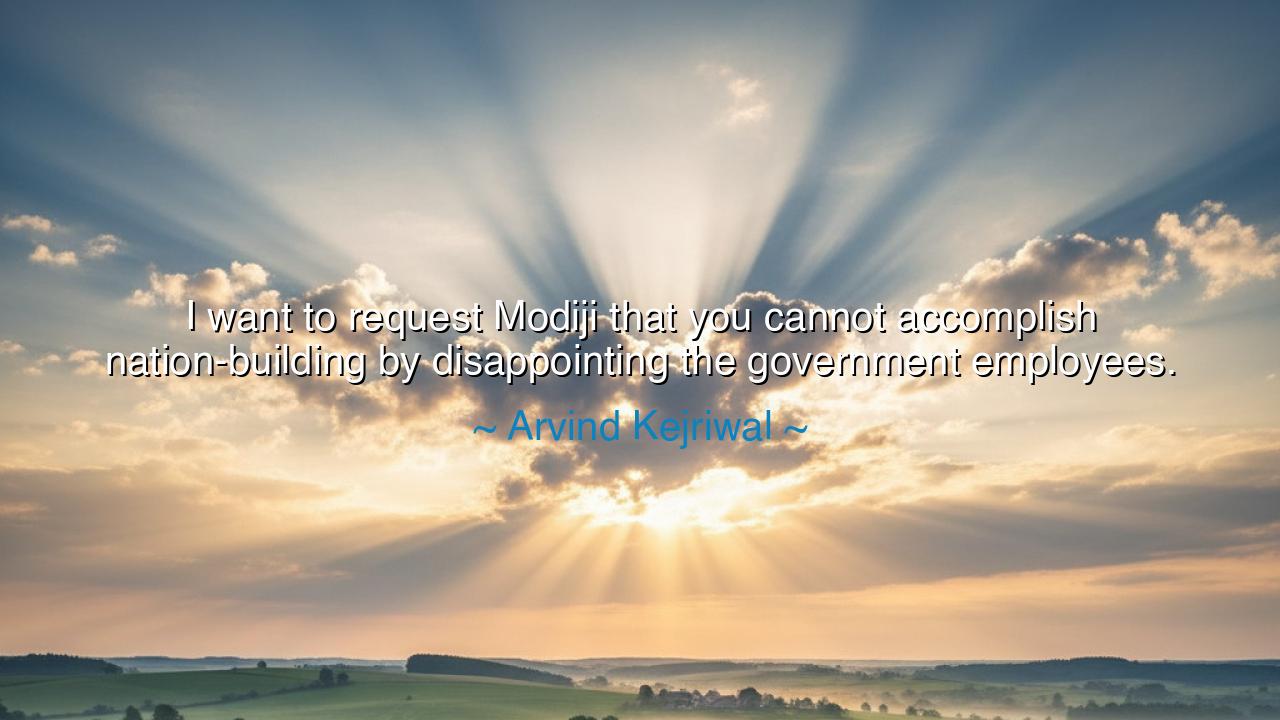
I want to request Modiji that you cannot accomplish
I want to request Modiji that you cannot accomplish nation-building by disappointing the government employees.






When Arvind Kejriwal declared, “I want to request Modiji that you cannot accomplish nation-building by disappointing the government employees,” he was not merely speaking as a political leader — he was speaking as a servant of the people, voicing an ancient truth about the bond between governance and those who labor to sustain it. His words resound with the wisdom that no ruler, however visionary, can build a nation upon the weariness or discontent of its own servants. For a government is not a tower that stands apart from its people — it is a living organism, drawing its strength from the dedication of every teacher, soldier, doctor, and clerk who serves beneath its flag. To dishearten the hands that build is to weaken the very foundation upon which progress rests.
The origin of this quote lies in the political debates and challenges of contemporary India, where questions of reform, welfare, and administration continually shape the nation’s destiny. Arvind Kejriwal, Chief Minister of Delhi, uttered these words in a plea to Prime Minister Narendra Modi — “Modiji,” as he is respectfully called — emphasizing that the morale and motivation of government employees form the spine of national development. The quote arose from tensions surrounding administrative control and the treatment of civil servants. Yet its significance stretches beyond the immediate dispute: it reflects a timeless truth about leadership and human dignity. A nation cannot thrive when those entrusted with carrying out its duties feel neglected, unappreciated, or constrained.
In the style of the ancients, Kejriwal’s words could be seen as a call to remember that every great empire was built not only by kings, but by the loyalty of their stewards. The ruler may dream, but it is the worker who gives the dream form. In the time of Emperor Ashoka, it was not the emperor alone who carried India’s message of dharma across the land; it was his couriers, administrators, and teachers who spread his vision of justice and peace. Ashoka understood that governance was not an act of command, but of cooperation. When leaders honor those who serve, they kindle a spirit that multiplies effort into greatness. But when they ignore or demoralize their servants, even the most radiant dream crumbles into dust.
History offers many warnings of what happens when the laboring class of a nation — especially those in public service — loses faith in its leaders. The fall of the Soviet Union is one such tale. For decades, the system relied upon millions of bureaucrats and workers who had once believed in the ideal of collective prosperity. But as corruption deepened and morale collapsed, the state machinery hollowed out from within. The people no longer served with pride but from compulsion, and the empire that once rivaled the world’s mightiest powers dissolved without a single battle. This is what Kejriwal’s words warn against: the silent decay that begins when those who serve lose heart.
Yet, his quote also carries a note of compassion — not confrontation. When he says, “you cannot accomplish nation-building by disappointing the government employees,” he is not condemning power, but calling it to conscience. He reminds all rulers that to govern is to nurture, not to dominate; to inspire, not to command. The civil servant who rises each morning to serve the public is not merely doing a job — he is performing a sacred duty. If his faith in the system falters, the nation itself falters. The leader, therefore, must not rule by fear or decree alone, but by respect and empathy, recognizing that every act of governance depends upon the unseen labor of the many.
There is deep emotional wisdom here: the recognition that nation-building is a collective act of faith. No temple, no constitution, no economy can endure if the hearts of the people who maintain it grow cold. The greatest leaders of history — from Abraham Lincoln to Mahatma Gandhi — understood this truth. Gandhi’s movement succeeded not through wealth or force, but because it uplifted the hearts of ordinary Indians — clerks, teachers, peasants, and workers — and gave them a reason to believe that their service mattered. When people feel valued, they give not only their labor, but their spirit. And that spirit is what builds a nation stronger than any army or treasury.
The lesson of Kejriwal’s words is thus both moral and practical: to lead is to serve those who serve others. Every citizen, every employer, every official should remember that progress cannot be demanded through pressure — it must be cultivated through gratitude and justice. Governments must treat their workers with fairness, pay them on time, protect their dignity, and trust their expertise. Only then will those workers carry out their duties with devotion and pride. In the same way, citizens must value the silent, tireless service of those who keep their nation running — from the policeman on the street to the clerk in a dusty office.
So let these words stand as a timeless teaching: no nation can rise higher than the spirit of those who labor for it. If rulers wish to build greatness, let them first build goodwill. If they seek loyalty, let them first show respect. For when the heart of the worker beats in harmony with the vision of the leader, a nation becomes unstoppable — its destiny shaped not by decrees from above, but by the united hands of all who serve beneath its sky.






AAdministratorAdministrator
Welcome, honored guests. Please leave a comment, we will respond soon